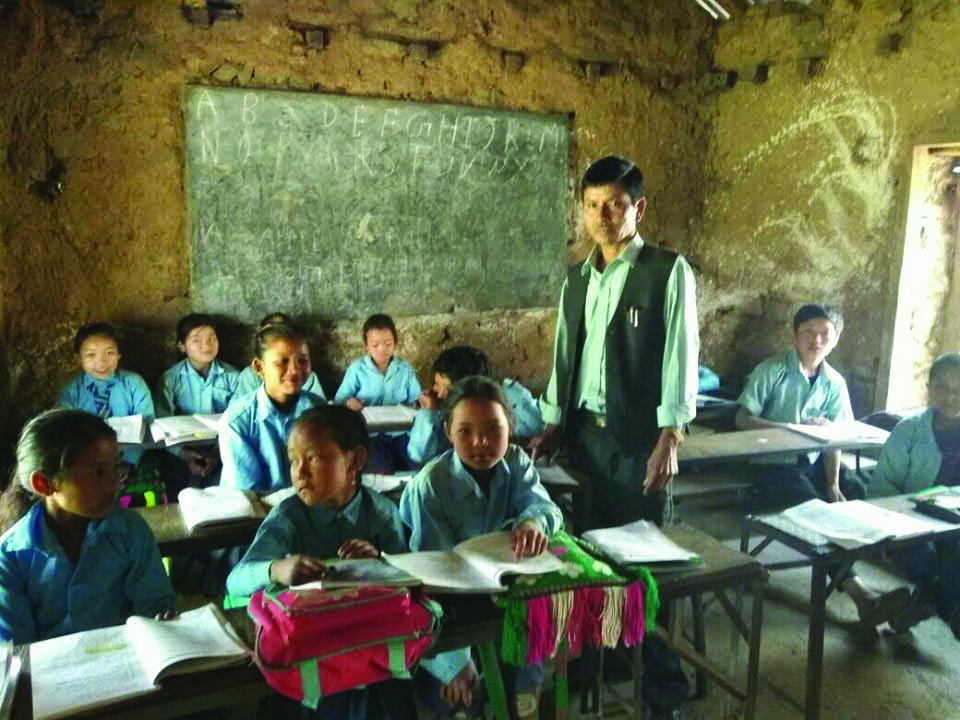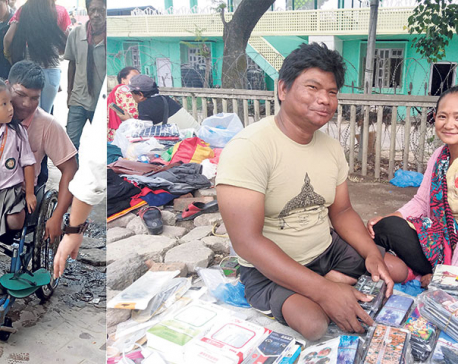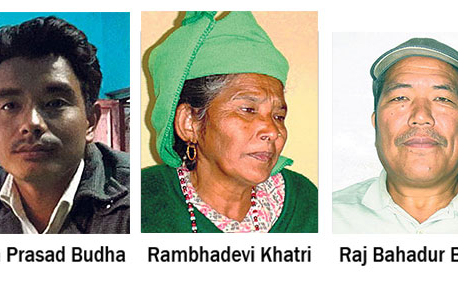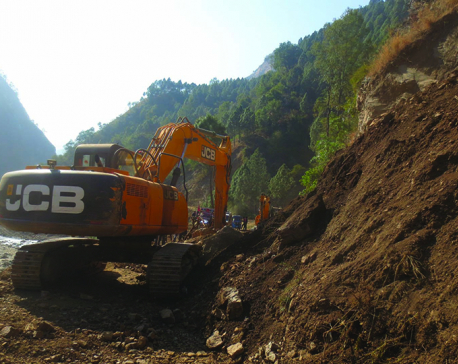
OR
Education blues

ROLPA, May 8: Even though the government has pledged free education up to the secondary level as child's fundamental right in the constitution, it does not provide financial resources to all community schools to pay teachers' salary and other resources a school needs.
Most community schools in rural parts of Rolpa district, lack government teacher quota. As per the government data, around 200 among 407 schools in Rolpa are being operated through financial resources contributed by poor locals, many of whom are laborers. As the fund collected through poor parents and guardians is not sufficient, these schools have been unable to hire quality teachers.
We want to change the scenario. But that needs a big budget. If we want to hire quality teachers, we need to be able to pay them a good salary. We have to bring educated people from elsewhere to Rolpa. And, who would come this far to teach unless salary and perks are attractive? --- Aash Bahadur Pun, Chairperson of Sunchhahari Rural Municipality
"Most of the schools in rural parts of the district don't have specialized subject teachers. Any teacher has to teach any subject. Finding a teacher itself is a matter of luck for these schools," said Lilamani Subedi, former resource person with the educational department at Sunchhahari Rural Municipality. "Had there been adequate teachers' quota in those schools, the situation would have been different."
Subedi stressed on the need to avail financial resources to community schools, warning that failure to do so might lead to their closure and subsequently affect children's education. "If financial resources are not provided to community schools, it will directly affect the education of children coming from economically poor families," he noted.
Children from well-to-do families of those areas are generally enrolled in residential English medium schools in Kathmandu or other cities. That is why community schools do not get the attention from all quarters of society, Subedi said.
"Sunchhahari Rural Municipality does not have even one plus-two level institution. Those who cannot afford to send their children away from home for studies are bound to limit their education below that level," Subedi further said.
Chairperson of the rural municipality, Aash Bahadur Pun agrees that Rolpa is not faring well in terms of education development. And without a good investment in this sector, change is hard to come by, he said.
"We want to change the scenario. But that needs a big budget. If we want to hire quality teachers, we need to be able to pay them a good salary. We have to bring educated people from elsewhere to Rolpa," he said. "And who would come this far to teach unless salary and perks are attractive?"
According to Pun, there are a very few educated locals in Rolpa. And fewer of them like to stay in their village and serve as teachers in local schools. "That is why quality education has become very costly for us. In lack of financial resources, we are struggling to operate our community schools," he admitted.
He stated that he would do the best on his part to every child's right to quality education. From next year, a bigger pie of the rural municipality's budget will be allocated to the education sector, he said.
"Presently local guardians are contributing towards the financial resources of schools by doing labor work. If they do not do so, schools cannot operate. But in the next fiscal year, we are committed to bringing improvements in this regard," Pun asserted.
Rolpa is not yet a happening place. Finding a menial job is a difficult job here. In such a situation, locals are contributing towards school funds and that is praiseworthy, he said.
Since the last few years, a lot of people here are employed in construction sites across the site. Most of these are road widening projects. "Road widening projects have been able to generate income for the poor people. This has helped them to contribute towards school's financial resources as well."
Recently locals here had protested the use of excavators in widening and opening of new road tracks. Stating that they were losing jobs to excavators, they had warned the construction companies for not using heavy machines.
According to Bagbir Gharti, principal at the Janata Secondary School of eastern Rolpa, the construction sites are not just providing jobs to men and women, but are also engaging children. "As they join their parents at work, they stop coming to school," he said. "Poverty and lack of awareness are the two biggest reasons behind high school dropout rates here," he added.
Gharti stated that not even half of the children admitted in school at the start of the new academic session attend school by the end of the year. "Many leave school midway. That is very sad."
As per the government data, around 95,000 children in the district are enrolled in school. As free education is not a reality here, communities are paying for teachers. At Sunchhahari Rural Municipality alone, there are around 80 privately hired teachers. "It is not easy to operate community schools in this way," Pun said.
You May Like This

For disabled in Valley, overcoming odds a daily struggle
KATHMANDU, Aug 6: What does it take to overcome disability barriers? For Sanjay Chaudhary, all it took was a disabled friendly... Read More...

Locals in cradle of Maoist insurgency say NO to conflict
(ROLPA, SURKHET, DANG) MARCH 17: Rolpa locals are uneasy these days about the activities of the Biplav outfit. They do not... Read More...

Rural roads being constructed in Rolpa without following procedures
ROLPA, Jan 28: Construction of roads was always the major demand of the people in Rolpa's villages and towns. This was... Read More...






Just In
- NRB introduces cautiously flexible measures to address ongoing slowdown in various economic sectors
- Forced Covid-19 cremations: is it too late for redemption?
- NRB to provide collateral-free loans to foreign employment seekers
- NEB to publish Grade 12 results next week
- Body handover begins; Relatives remain dissatisfied with insurance, compensation amount
- NC defers its plan to join Koshi govt
- NRB to review microfinance loan interest rate
- 134 dead in floods and landslides since onset of monsoon this year











Leave A Comment